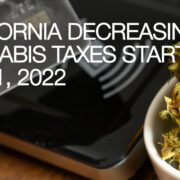California Decreasing Cannabis Taxes Starting July 1, 2022
Every six months the California Department Of Tax And Fee Administration (CDTFA) which oversees the reporting and collection of taxes for the California cannabis industry re-determines the cannabis markup rate. This rate is the markup between the wholesale cost and the retail selling price and is based on statewide market data. For the period commencing July 1, 2022, and ending December 31, 2022, the markup rate will be 75% (down from 80%).
Cannabis Excise Tax
The 15% cannabis excise tax is based on the average market price of the cannabis or cannabis products sold in a retail sale. The mark-up rate is used when calculating the average market price to determine the cannabis excise tax due in an arm’s length transaction. In an arm’s length transaction, the average market price is the retailer’s wholesale cost of the cannabis or cannabis products plus, the mark-up rate determined by the CDTFA. In a non-arm’s length transaction, the average market price is the cannabis retailer’s gross receipts from the retail sale of the cannabis or cannabis products.
Cannabis Cultivation Tax
As required by the Cannabis Tax Law, effective January 1, 2020, the cultivation tax rates reflect an adjustment for inflation. The adjusted rates for each category shown below will be reflected on the monthly and quarterly cannabis tax returns beginning January 1, 2020.
| Cannabis Category | 2022 Rate | 2020 Rate |
| Flower per dry-weight ounce | $10.08 | $9.65 |
| Leaves per dry-weight ounce | $3.00 | $2.87 |
| Fresh cannabis plant per ounce | $1.41 | $1.35 |
- The 2022 rates apply to cannabis that a cultivator sells or transfers to a manufacturer or distributor on or after January 1, 2022.
- All fresh cannabis plants must be weighed within two hours of harvesting.
If you are a cannabis retailer, you are required to collect the cannabis excise tax from your customers on each retail sale of cannabis or cannabis products starting January 1, 2018, and pay the excise tax to a distributor. Distributors are liable for paying the cannabis taxes to the CDTFA.
Invoice Requirements
Retailers are required to provide purchasers with a receipt or other similar document that includes the following statement – “The cannabis excise taxes are included in the total amount of this invoice.”
Recordkeeping
Every sale or transport of cannabis or cannabis products must be recorded on an invoice or receipt. Cannabis licensees are required to keep invoices for a minimum of seven years.
Distributors (or in some cases manufacturers) are responsible for collecting the cannabis cultivation and excise taxes, and the invoices they provide must include, among other specified requirements, the amount of tax collected.
Retailers, cultivators, and manufacturers must keep these invoices as verification that the appropriate tax was paid.
How This Impacts The Black Market
Legal California cannabis businesses have been complaining about taxes, which in parts of the state are among the highest in the nation. Many believe that these taxes on compliant cannabis operators while still mandating compliance with State and local regulations will widen the price disparity gap between cannabis products sold in the black market vs. cannabis products sold in the legal market. But with the State stepping up its enforcement efforts to uncover and prosecute illegal cannabis operators, the State is hoping to eliminate this discrepancy by eradicating non-compliant operators.
What Should You Do?
Start your cannabis business on the right track. Protect yourself and your investment by engaging the cannabis tax attorneys at the Law Offices Of Jeffrey B. Kahn, P.C. located in Orange County (Irvine), Los Angeles County and other California locations. We can come up with tax solutions and strategies and protect you and your business and to maximize your net profits. Also, if you are involved in crypto currency, check out what a bitcoin tax attorney can do for you.



 Follow
Follow Follow
Follow